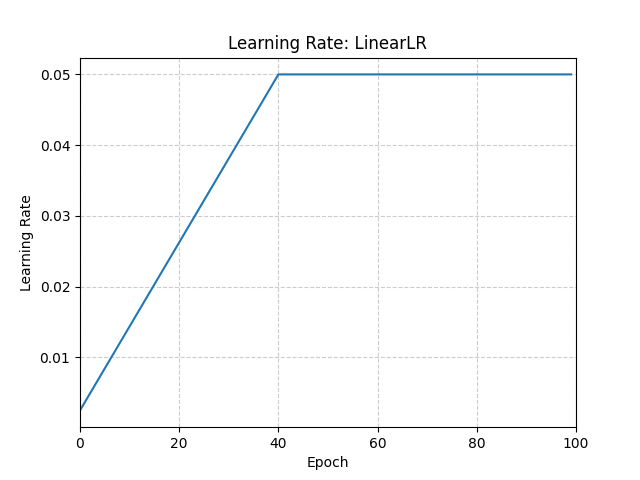LinearLR#
- class torch.optim.lr_scheduler.LinearLR(optimizer, start_factor=0.3333333333333333, end_factor=1.0, total_iters=5, last_epoch=-1)[source]#
Decays the learning rate of each parameter group by linearly changing small multiplicative factor.
The multiplication is done until the number of epoch reaches a pre-defined milestone: total_iters. Notice that such decay can happen simultaneously with other changes to the learning rate from outside this scheduler. When last_epoch=-1, sets initial lr as lr.
- Parameters:
optimizer (Optimizer) – Wrapped optimizer.
start_factor (float) – The number we multiply learning rate in the first epoch. The multiplication factor changes towards end_factor in the following epochs. Default: 1./3.
end_factor (float) – The number we multiply learning rate at the end of linear changing process. Default: 1.0.
total_iters (int) – The number of iterations that multiplicative factor reaches to 1. Default: 5.
last_epoch (int) – The index of the last epoch. Default: -1.
Example
>>> # Assuming optimizer uses lr = 0.05 for all groups >>> # lr = 0.003687 if epoch == 0 >>> # lr = 0.004875 if epoch == 1 >>> # lr = 0.006062 if epoch == 2 >>> # lr = 0.00725 if epoch == 3 >>> # ... >>> # lr = 0.05 if epoch >= 40 >>> scheduler = LinearLR(optimizer, start_factor=0.05, total_iters=40) >>> for epoch in range(100): >>> train(...) >>> validate(...) >>> scheduler.step()

- get_last_lr()[source]#
Get the most recent learning rates computed by this scheduler.
- Returns:
A
listof learning rates with entries for each of the optimizer’sparam_groups, with the same types as theirgroup["lr"]s.- Return type:
Note
The returned
Tensors are copies, and never alias the optimizer’sgroup["lr"]s.
- get_lr()[source]#
Compute the next learning rate for each of the optimizer’s
param_groups.Scales the
group["lr"]s in the optimizer’sparam_groupssuch that successive steps interpolate linearly fromstart_factorup toend_factoracrosstotal_iterssteps.- Returns:
A
listof learning rates for each of the optimizer’sparam_groupswith the same types as their currentgroup["lr"]s.- Return type:
Note
If you’re trying to inspect the most recent learning rate, use
get_last_lr()instead.Note
The returned
Tensors are copies, and never alias the optimizer’sgroup["lr"]s.
- load_state_dict(state_dict)[source]#
Load the scheduler’s state.
- Parameters:
state_dict (dict) – scheduler state. Should be an object returned from a call to
state_dict().
- state_dict()[source]#
Return the state of the scheduler as a
dict.It contains an entry for every variable in
self.__dict__which is not the optimizer.
- step(epoch=None)[source]#
Step the scheduler.
- Parameters:
epoch (int, optional) –
Deprecated since version 1.4: If provided, sets
last_epochtoepochand uses_get_closed_form_lr()if it is available. This is not universally supported. Usestep()without arguments instead.
Note
Call this method after calling the optimizer’s
step().

